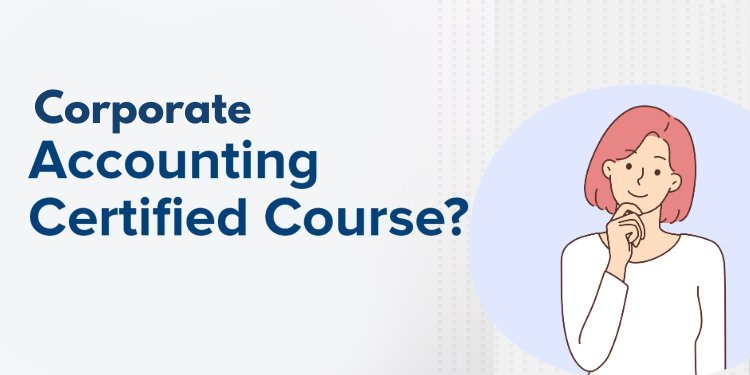Is the Corporate Accounting Course Future Proof?
The Corporate Accounting Course offers future-proof skills for evolutionary financial landscapes, digital tools, and high-demand roles within finance.

A Corporate Accounting Course provides students with every skill required for reporting finance, compliance, and analysis in accounts. The primary benefits of this course are that these skills are in high demand from businesses of any industry surety for job security and growth. Certifications also make for a future-proof investment as more and more businesses are looking for apt financial management. So, What is the question? Is a Corporate Accounting Course suitable for a long-term career? Let's look at why this kind of course can be a smart investment for long-term growth. We will also see how Tally, Taxation, GST, and Accounting Courses can help build a strong and flexible skill set.

Why choose a Corporate Accounting Course?
Corporate accounting relates to the management of a company's financial records and their analysis in order to assist in its goals and in adhering to rules and regulations. Corporate accountants manage reports, taxes, budgets, and plans. These are critical activities towards an international standard. It is very practical that businesses grow complicated and seek out talented accountants who may analyze financial data to guide strategic decisions.
Corporate accountants need information beyond that in the typical accounting textbook. They should be informed about these developments in new technology, regulatory changes, and industry trends. Corporate accounting courses can offer just such training, balancing theory with practice to build a solid, adaptable base for the future.
How a Corporate Accounting Course Stays Relevant in a Digital World
The field of corporate accounting is evolving rapidly in response to new technologies like artificial intelligence, data analytics, and machine learning. Modern corporate accounting courses are adapting to these changes by incorporating digital tools and automation into their curriculum. Here’s how a relevant Corporate Accounting Course prepares accounting professionals to excel in today’s tech-driven environment:
1. priority on Technology Integration
⦁Courses now focus on essential digital tools that automate data entry, reporting, and financial analysis.
⦁Training in AI, data analytics, and machine learning provides accountants with the skills to make informed, data-driven decisions.
2. Practical Training with Specialized Software
⦁Core components of these courses often include practical sessions on widely used accounting software such as Tally and SAP.
⦁These tools enhance efficiency by automating complex tasks, ensuring accountants are well-prepared for the digital demands of their roles.
3. Data Analytics Tools
⦁ Accountants learn to work with data analytics tools, essential for analyzing financial trends, forecasting, and strategizing effectively.
⦁ The ability to interpret data and generate insights gives professionals a competitive edge in a data-driven industry.
4. Significance of Tally in Corporate Accountancy
⦁ Tally training remains a staple in accounting courses, due to its broad use in automating tasks like invoicing and inventory management.
⦁ With integrated GST and payroll modules, Tally simplifies regulatory compliance and financial processes, making it invaluable for corporate accountants.
5. SAP and Advanced Software Training
⦁Courses often include SAP training, enabling accountants to handle complex business accounting requirements.
⦁These tools are especially beneficial for managing enterprise-level financial data and streamlining workflows in large organizations.
6. Adapting to GST and Payroll Requirements
⦁Tally’s integration of GST and payroll functions helps accountants deliver accurate and compliant services.
⦁This training ensures that accountants can manage modern financial systems efficiently, meeting the regulatory needs of businesses.
7. Future-Proofing the Profession
⦁By staying updated with digital tools and emerging trends, corporate accounting courses ensure that professionals are not only equipped for today’s needs but are also prepared to adapt to future advancements.
⦁This future-proof approach makes these courses Crucial for long-term career growth in accounting.
Is Accountancy a Recession-Proof Career?
Navigating today's job market can be daunting. Students and professionals alike fear about the long-term stability of a career. Will your qualifications last long enough to be safe from a recession? Accountancy is a resounding yes!
This article is on recession-proof accountancy in times of economic uncertainty and industry shifts.
Accountancy is one of those stable options that stand out from the rest. Even in economic downturns, any company remains in need of financial expertise in such critical activities as management, reporting, and compliance. This steady demand underlines accountancy as one that never seems to lose relevance and thus remains in constant demand in almost every industry.
Core Areas of a Future-Proof Corporate Accounting Curriculum
However, a corporate accounting curriculum can be made future-proof with a few core areas representing both current demands and future requirements:
1. Technology-Enhanced Financial Analysis
Accountants are now not only gathered to collect financial data but also mandated to analyze and interpret such data as data becomes central to decision-making. Analytics, AI, and data visualization courses provide tools that modern accountants need to make informed decisions based on financial data.
2. Knowledge of Regulative Applicable Regulations and Compliance
The entire landscape of taxation and regulatory compliance is constantly changing. So, accountants need to update their knowledge about changes in the law to avoid any kind of issues in an organization and maximize tax benefits. At this point, the taxation course plays a significant role, which gives the latest knowledge in tax laws, policies, and working abilities to prepare and file tax documents properly.
3. International Financial Reporting Standards (IFRS)
As globalization increases, many companies are of interest in more than one country. Thus, knowledge of IFRS has emerged as a treasure. Courses on IFRS ensure that an accountant is able to work for an international firm but handle financial records abiding by international standards.
4. Training on Automation and Accounting Software
Technology is here to stay, and accountants have to learn not to depend solely on human capabilities for repetitive tasks but on software-based tools. In addition to a Tally Course, one must have familiarity with SAP, QuickBooks, and even specialized ERP systems. These will enhance productivity and minimize errors caused by human behavior.
5. Soft Skills and Ethical Awareness
Accountants should play an advisory role in organizations. Courses that develop communication, problem-solving, and ethical skills are essential for future-ready accountants who can contribute to an organization's financial strategy.
Further courses to enhance corporate accounting skills
Corporate accounting is an extremely broad field; additional certifications can significantly enhance career prospects. A few of the key courses that build the skill set of a corporate accountant and keep it relevant and futuristic are as follows:
1. GST Course
In the event of Goods and Services Tax (GST) applicable in India, every company has to cope with a new set of taxation rules. A GST Course is actually extensive knowledge of GST regulations, registration procedures, and filing of forms. GST-capable accountants can ensure tax compliance for companies and manage audits so effectively that an organization would be lucky to have them.
2. Accounting Course
For someone willing to enter the Indian market, it provides special knowledge regarding the specific needs of the region. It is perfect to understand tax laws, financial regulations, and accounting approaches unique to India. Most courses also present case studies; work on real cases will help improve more practical skills that are highly preferred today.
3. Taxation Course
Advanced taxation is a topic corporate accountants should learn to enhance their knowledge in dealing with the administration of tax liabilities of an organization. Tax laws are in a state of flux, and a professional who understands the nuances of tax planning and compliance can ensure the financial soundness of an organization by reducing its tax liabilities and maintaining proper records.
The Job Market for Corporate Accountants: A Bright Prospect
The demand for skilled accountants is likely to be high even with the advancement of technology. Corporate accounting becomes more complicated and demanding in its requirements as the business grows and becomes more diversified than simple bookkeeping alone. Thus, especially in sectors like finance, tech, health care, and e-commerce, accountants holding skills in financial analysis, taxes, and compliance are in very high demand.
These sought-after skills, therefore, make certified corporate accountants stand out in the job market. They have better prospects of being hired by the big companies and usually command better pay. Industry reports suggest that those who have gone beyond the basic accounting qualifications and acquire higher-level practical skills on tools such as Tally, and those who know all about taxation, have better job stability and scope for career growth.
Preparation for Future Trends: Continuous Learning and Certification
- Accountants need to embrace lifelong learning to remain relevant in the field because of the rapid speed at which the Race of change advances in technology and regulatory requirements. This future-proofing is therefore critically important, achieved through certifications and periodic updates to courses.
- Many reputable corporate accounting programs offer workshops and webinars that enable professionals to refresh their knowledge in their particular areas of interest and remain better than the industry trend.
- Second, online courses are a great facilitator that enables working professionals to acquire such skills without the need to take time off. Take the case of an accountant who is actively working and is engaged to remain updated with new tax policies at the same time. He can take an online course on taxation or GST to keep himself well-posted on recently implemented tax policies.
Conclusion: Is Corporate Accounting Future-Proof?
In a nutshell, a corporate accounting course can be considered absolutely future-proof if it contains training on recent tools and technology and also incorporates industry practice. So long as businesses operate within financial frameworks, the need for skilled accountants will never come to pass. A combination of a corporate accounting course with specializations such as Tally, GST, and taxation ensures a basket of skills necessary in the market today and prepares for the future.
What's Your Reaction?















